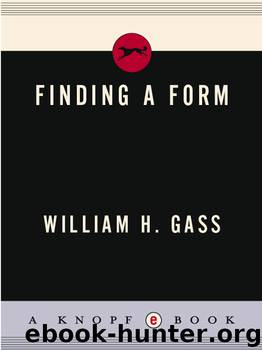Finding a Form by William H. Gass

Author:William H. Gass [Gass, William H.]
Language: eng
Format: epub
ISBN: 978-0-8041-5093-4
Publisher: Knopf Doubleday Publishing Group
Published: 2013-10-01T16:00:00+00:00
We believe him because what he writes “rings true,” but also because, like Cephalus in Plato’s Republic, he is now nearly free of the world and its ambitions, of the body and its desires. Almost equally wonderful is the account by Apsley Cherry-Garrard of Scott’s last Antarctic expedition in The Worst Journey in the World, or James Hamilton-Paterson’s luminous description of life on a deserted Philippine island, Playing with Water.
Nonetheless, these aren’t autobiographies yet, for they’re not full; and no one wants to wade through your parents just to get to the South Face, or read about your marriage in order to enjoy your jungle escapades; furthermore, many of these memories are so completely about a few things seen or endured or somehow accomplished that they are little different from the excited jabber of the journalist who has stumbled on a camp of murderous thugs (you’ve seen the film) or stood in the square where the martyrs were made, and whose account consequently cannot be called by that uncle-sounding name of Auto, for where is the “I,” old “I,” sweet “I,” the “I”? Though the so-called new journalism, which Capote and Mailer practiced for a while, made even reporters into pronouns, disgracing the profession.
Of course, there are a few minds whose every move is momentous, and a few whose character is so complex, complete, and elevated, that we wish to know how? and why? and a few whose talent is so extraordinary, their sensibilities so widely and warmly and richly developed, that we think (naively, oh so naively) that they must have bounced out of bed like a tumbler, cooked morning eggs as if hatted like a chef, and leaped to their work with the grace of a dancer. We think them gods, or Wittgensteins. Just because their off-rhymes did not smell like something spoiled.
But he has a lifeful of private knowledge, our autobiographer. He knows of acts, small and large, that only he witnessed, only he remembers; she recalls a taste from an ancient swallow, or a scent that her lover loved but only she remembers, or a feeling on seeing her first egg cracked or baby beaten; yes, surely Lincoln recollects the rain on the roof when he signed the Proclamation; and don’t you remember when you were a burgeoning boy whacking off in the barn before the boredom of the sheep—how the straw stuck to your sweater, and a mysterious damp darkened the bowl of your knees? Yet of just what use are these sensations to a real biographer, whose interest is in the way you lived solely because of its possible bearing on what you did? And whose interest in what you did exists principally because of the perplexities to which it led?
Between ego and object we teeter-totter. When the autobiographer says, “I saw,” he intends the report of his perception to modify his ego, not merely occupy his eye; he is the prophet who is proud he has talked to God, not the witness who is eager to describe God’s garb and what leaves moved when the bush spoke.
Download
This site does not store any files on its server. We only index and link to content provided by other sites. Please contact the content providers to delete copyright contents if any and email us, we'll remove relevant links or contents immediately.
| African | Asian |
| Australian & Oceanian | Canadian |
| Caribbean & Latin American | European |
| Jewish | Middle Eastern |
| Russian | United States |
4 3 2 1: A Novel by Paul Auster(12354)
The handmaid's tale by Margaret Atwood(7729)
Giovanni's Room by James Baldwin(7301)
Asking the Right Questions: A Guide to Critical Thinking by M. Neil Browne & Stuart M. Keeley(5741)
Big Magic: Creative Living Beyond Fear by Elizabeth Gilbert(5726)
Ego Is the Enemy by Ryan Holiday(5392)
The Body: A Guide for Occupants by Bill Bryson(5065)
On Writing A Memoir of the Craft by Stephen King(4920)
Ken Follett - World without end by Ken Follett(4705)
Adulting by Kelly Williams Brown(4552)
Bluets by Maggie Nelson(4534)
Eat That Frog! by Brian Tracy(4499)
Guilty Pleasures by Laurell K Hamilton(4423)
The Poetry of Pablo Neruda by Pablo Neruda(4079)
Alive: The Story of the Andes Survivors by Piers Paul Read(4009)
White Noise - A Novel by Don DeLillo(3990)
Fingerprints of the Gods by Graham Hancock(3979)
The Book of Joy by Dalai Lama(3960)
The Bookshop by Penelope Fitzgerald(3827)
